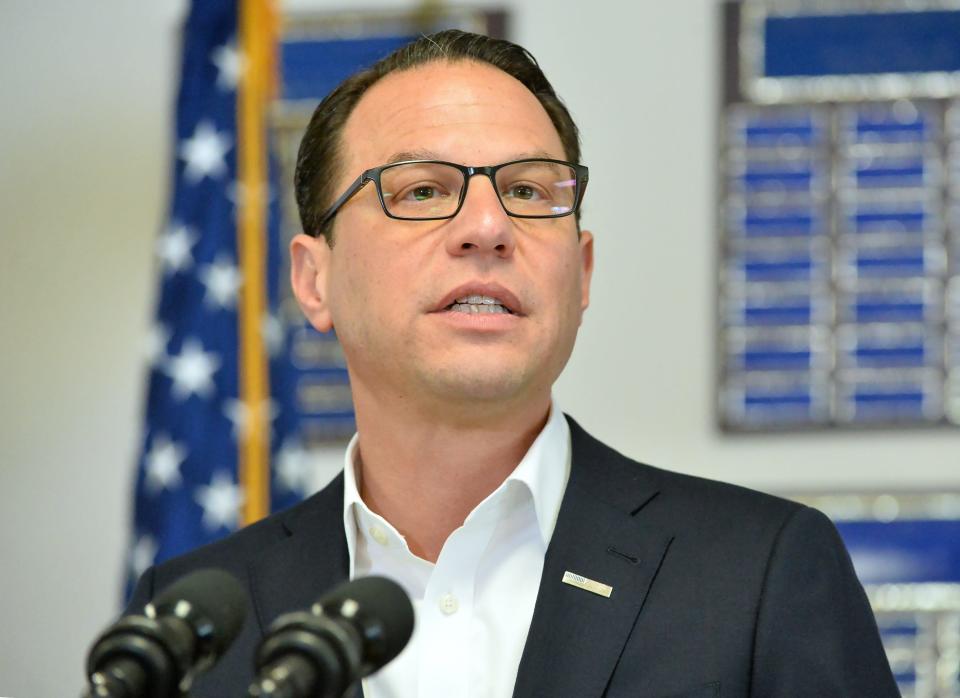Pa. governor, Legislature wrapping up remarkably unproductive year. What happened?
Pa. Pressroom is a regular recap of politics in Harrisburg and Washington, D.C. To submit tips and news leads, contact USA TODAY Network Pennsylvania state capital bureau reporter Bruce Siwy at bsiwy@gannett.com or on X at @BruceSiwy.
The approaching end of 2023 will close a remarkably unproductive chapter in the history of the Pennsylvania Legislature.
As of Dec. 3, Gov. Josh Shapiro had signed just 32 new bills into law. That's fewer than a third of the 96 approved by former Gov. Tom Wolf during his first year in office — a year in which the Democratic governor was locked in a prolonged budget standoff with a Republican-controlled Legislature.
Retired lobbyist Vince Phillips, a keen observer of Harrisburg politics, sees multiple reasons for the legislative malaise this year.
First, he said, was the post-midterms dispute over which side held the true majority in the House of Representatives. A handful Democrats vacated seats throughout the session after winning elections for higher office, putting their slim one-vote majority in sporadic limbo.
The situation was complicated by changes in leadership, with state Rep. Mark Rozzi (D-Berks) taking the job in January through bipartisan vote only to concede it through a party-line vote in late February to Joanna McClinton (D-Philadelphia).
Ill will, according to Phillips, has also risen in the Capitol. Republican leaders have accused Shapiro, for instance, of trying to sweep a former aide's sexual harassment scandal under the rug and of breaking a handshake deal to include a $100 million private school voucher program in his inaugural budget.

"Raw partisanship, the likes of which I've not seen in Harrisburg for a long time, crippled much of the House's ability to work," Phillips said, noting that Democratic leadership has gaveled out of session for extended periods when the political split was an even 101-101 because of temporary vacancies.
He added that while the bills have been few, measures such as expanding Right-to-Know Law provisions to state-related universities in House Bill 1556 and strengthening the insurance privacy law in House Bill 739 have been bipartisan victories for Pennsylvanians and their elected officials in Harrisburg.
The Commonwealth Foundation, a conservative Harrisburg think tank, has been tracking this lack of legislative activity for several months. They noted this summer that Shapiro had signed 15 bills by the end of July, when the average number has been 86 for that time period over the past half-century.
"I am surprised that he's not been able to do that, to show the capacity to make some of those deals," Commonwealth Foundation Executive Vice President Nathan Benefield told the USA TODAY Network. "Wolf's first year was the huge budget impasse and yet they still got more bills across the desk than they have under Shapiro."
Benefield said Shapiro's term is comparing more closely to former Republican Gov. Tom Corbett's tenure than to Wolf's first term. While Wolf was antagonistic toward the Legislature's GOP majority, both Corbett and Shapiro appear to employ a hands-off approach.
"He's certainly not using the bully pulpit to drive legislation," Benefield said. "I think a lot of people expected, including myself, that he would, having been in the Legislature before."
Political leanings aside, neither Phillips nor Benefield expects much to change in 2024.
"I think you may see next year look like this year, only worse," Phillips said, noting that legislation becomes more difficult to pass in the hyper-partisan climate that festers during election years. "If you think it's political now, just wait."
Inside the Beltway
Late last month, hackers with an anti-Israeli message targeted the Municipal Water Authority of Aliquippa in Beaver County.
An Iranian-backed group called Cyber Av3ngers took credit for the hack, as reported by KDKA-TV. U.S. Rep. Chris Deluzio (D-Pa.) said he was quickly in contact with local municipal leadership, reporting that water service had not been disrupted in spite of the cyberattack.
"Federal officials are assisting the investigation, and I remain ready to help with federal agencies," Deluzio wrote on social media.
"Attacks on our critical infrastructure like water are unacceptable. ... I intend to push for a full investigation here and accountability for the attackers, and I will continue the important bipartisan work of the House Armed Services Cyber, Information Technologies, and Innovation (CITI) Subcommittee to shore up America's defenses."
And the horse race
A second Republican has formally entered next year's hunt for Pennsylvania attorney general.
Katyoun "Kat" Copeland, a former Delaware County assistant district attorney, announced her candidacy Nov. 20. She'll try to succeed Attorney General Michelle Henry, a Democrat who has declared she has no intention to run for the office she's occupied since being appointed earlier this year.
"I’m going to aggressively investigate and prosecute anyone who tries to sell drugs in our state ― there will be zero tolerance for those who peddle deadly heroin and fentanyl into our communities,” Copeland said.
“I’m going to investigate and prosecute anyone who preys upon our seniors. I will protect children and families from child predators, pornographers and those who use the internet as a weapon against our children. And unlike previous attorneys general, I will stand up to Philadelphia District Attorney Larry Krasner and prosecute anyone who commits a gun crime or traffics guns in Philadelphia.”
Thus far, Copeland and York County District Attorney Dave Sunday are the Republicans in the race, while the Democratic field includes Philadelphia's chief public defender Keir Bradford-Grey, former state Auditor General Eugene DePasquale, former Bucks County solicitor Joe Khan and state Rep. Jared Solomon (D-Philadelphia).
This article originally appeared on York Daily Record: New PA laws have been rare in 2023

